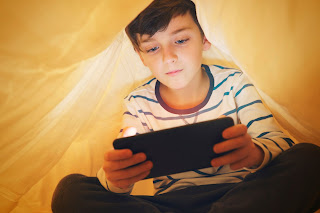Reducing screen time can help children be more physically active

Illustration by Becky Wright, Happiful
—–
Reducing screen time seems to encourage children to be more physically active, but it’s unclear whether it can help them get better sleep.
A study by researchers at the University of Southern Denmark involved 89 families from 10 municipalities in the region. The researchers assigned each family to one of two groups: 45 families (including 86 children and 82 adults) were assigned to the intervention group and told to limit the amount of time they spent using electronic devices, and 44 families (95 children and 82 adults) were assigned to a control group and told to continue using electronic devices as usual. In the intervention group, some of the adults could not give up their smartphones because of work, but in each family, at least one adult was able to relinquish their smartphone and replace it with a non-smartphone. The participants in the intervention group were allowed up to 30 minutes of necessary screen time a day for activities such as coordinating appointments.
The intervention lasted two weeks. The researchers determined that was long enough for the participants to adapt to a life with less screen time while still remaining compliant with the study. To be considered compliant, participants had to have no more than seven hours of screen media use during the period. Screen media use was measured with noncommercial apps and a television monitor developed in-house and installed by a research team member. The study is published in JAMA Network.
After the two weeks, the researchers noticed a significant difference in rates of physical activity between two groups. Children in the intervention group averaged 45 more minutes of moderate to vigorous physical activity, while children in the control group averaged just 1 minute more. There was also a far greater difference in how much time children in the intervention group engaged in leisure, non-sedentary activities than in children in the control group.
No significant difference was found in adults between the groups. Nor was there a significant difference in any of the children’s or adults’ sleeping habits, including total sleep duration, sleep onset latency, wake after sleep onset in children and adults, or the duration of stage of sleep lasts in children or adults. The researchers noted how the results for sleep parameters in children are not consistent with evidence from a systematic review of trials targeting screen media use (often in combination with co-interventions).
The researchers said the large effect on physical activity suggests that the high levels of recreational screen media use seen in many children should be a public health concern and emphasizes the importance of developing and implementing measures to balance recreational screen media use to prevent physical inactivity in children.